- Y.Sh
- Persian Tasty
- 2203 views
- 0 comments
Cashews are a type of nut with a soft consistency and sweet flavor. Cashews are sold both raw or roasted and salted or unsalted.
Cashews have recently been used to make dairy alternatives, such as cashew milk, cheese, cashew-based cream sauces, and sour cream.
This article gives information on cashews' nutritional value and potential health benefits. You will also find some tips on including cashews in the diet and learn about potential health risks.
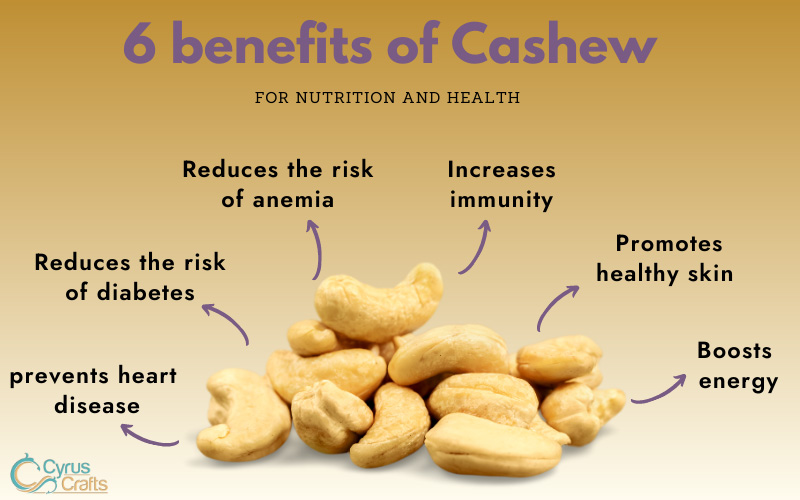
What is Cashew?
In many parts of the world, cashew trees are cultivated for their nuts. They originate in Brazil but are planted globally.
Cashews are similar to peanuts but contain more copper, manganese, and magnesium. Some consider them a healthier alternative to peanuts because they have fewer omega-6 fatty acids and more omegas 3. A bad imbalance of these fatty acids is connected to inflammation and chronic diseases.
Many people eat cashews regularly and need to understand their origins. The nut may seem raw when sold as a snack, but it's toxic in its freshly picked form. Roasting makes cashews safe for consumption.
Even after heat treatment, someone must remove the cashew's exterior to access the tasty product. This labor-intensive process accounts for the cashew's high price and special status, even among similar nuts. If you want to buy nuts, you can go to the Cyruscrafts store.
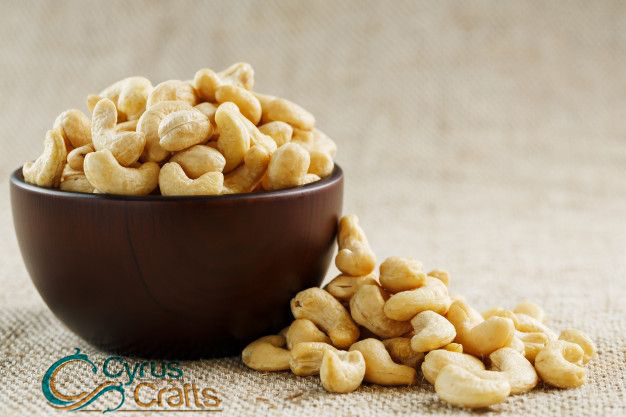
Nutrition of Cashew
According to the Scientific Articles, 1 ounce of raw cashews (28.35 grams) contains:
| INFORMATION | AMOUNT |
|---|---|
| Calories | 157 |
| Carbohydrate | 8.56g |
| Sugar | 1.68g |
| Fiber | 0.9g |
| Protein | 5.17g |
| Fat | 12.43g |
| Calcium | 10mg |
| Iron | 1.89mg |
| Magnesium | 83mg |
| Phosphorus | 168mg |
| Potassium | 187mg |
| Sodium | 3mg |
One ounce of cashews equals about 18 whole nuts. Cashews are high in monounsaturated and polyunsaturated fats and provide a good amount of protein per serving.
Cyrus Crafts; Luxury & Unique Products
Cashews Benefits
Cashews are popular for their flavor and health benefits but are always sold in their shells due to unsafe resin. However, purchasing raw cashews or roasted ones with various flavorings is possible. You can use them as a snack or add them to salads, smoothies, and other meals. With each serving of cashews, you harness incredible health benefits that set them apart from other nuts.
Cashew Antioxidants
Nuts and seeds are considered antioxidant powerhouses, and cashews are no exception.
Antioxidants protect your body from free radicals. This helps reduce inflammation and increases your body's ability to stay healthy and disease-free.
Cashews are a rich source of polyphenols and carotenoids — two antioxidants also found in other tree nuts.
Studies link antioxidants in nuts like walnuts, peanuts, and almonds to lower levels of oxidative cell damage. (I briefly explained this characteristic of peanuts in the peanuts article.)
Due to their similar antioxidant profile, cashews may be expected to offer similar oxidation-fighting benefits. This may be particularly true of roasted cashews, which appear to have an increased antioxidant activity compared with their "raw" counterparts.
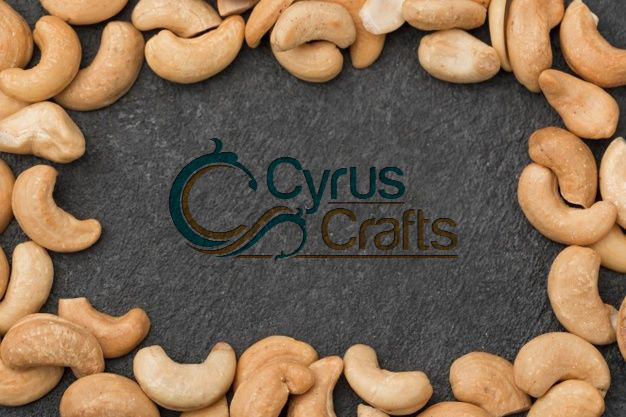
Cashews may Help You Lose Weight
Nuts are rich in calories and fat. Hence, people who want to lose weight have traditionally limited the number of nuts in their diet according to dietary advice.
However, research is starting to link nut-rich diets to more significant weight loss and lower body weight than nut-free diets. Cashews providing the body with fewer calories partly explained this more than once thought.
According to the FoodData Central database of the United States Department of Agriculture (USDA), cashews provide 157 calories per 1-ounce (28-gram) serving. However, recent research suggests that the human body may only digest and absorb around 84% of these calories. It does not absorb the fat during digestion.
On the other hand, roasting or grinding nuts may increase your body's ability to digest them fully, increasing the number of calories absorbed. As a result, weight loss benefits may be vital for whole, "raw" cashews, but more research is needed to confirm this. And you may be sacrificing the antioxidant benefit that comes with roasting cashews.
In addition to providing fewer calories than expected, nuts are also rich in protein and fiber, which are known to reduce hunger and promote feelings of fullness, which can further promote weight loss.
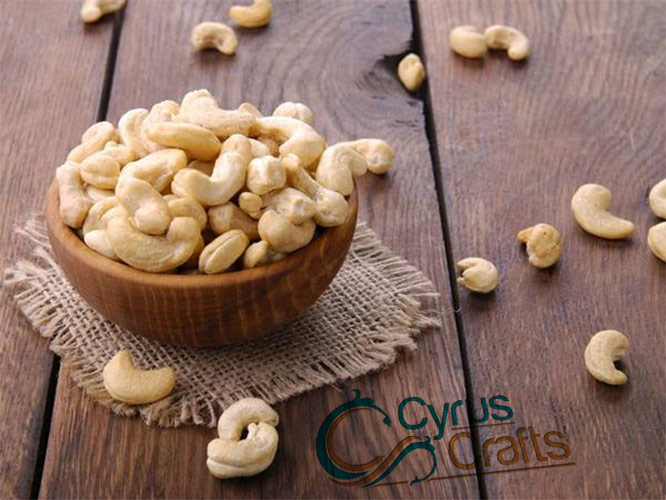
Cashews Can Improve Heart Health
The original sentence is already in the active voice. No need to change it.
A few studies have focused on the specific heart health benefits of cashews.
One found that people with type 2 diabetes who consumed 10% of their daily calories from cashews had lower LDL (bad) cholesterol to HDL (good) cholesterol ratios than those who ate no cashews. A low LDL to HDL ratio is typically a marker of good heart health.
Two other studies link cashew nut consumption to higher HDL cholesterol levels, lower blood pressure, and lower total and LDL cholesterol levels.
However, a recent review shows conflicting results. One of the included studies suggests that regular intake of cashews may lower blood pressure and triglyceride levels. However, it finds no effect on total LDL or HDL cholesterol levels.
Similarly, another review failed to find any significant changes in cholesterol or triglyceride levels after consuming 1–3.8 ounces (28–108 grams) of cashews daily for 4–12 weeks.
These inconsistent results may be due to the limited number of studies and small participant sizes. They conclude that although cashews are just as likely to benefit heart health as other nuts, more research is needed to confirm this.
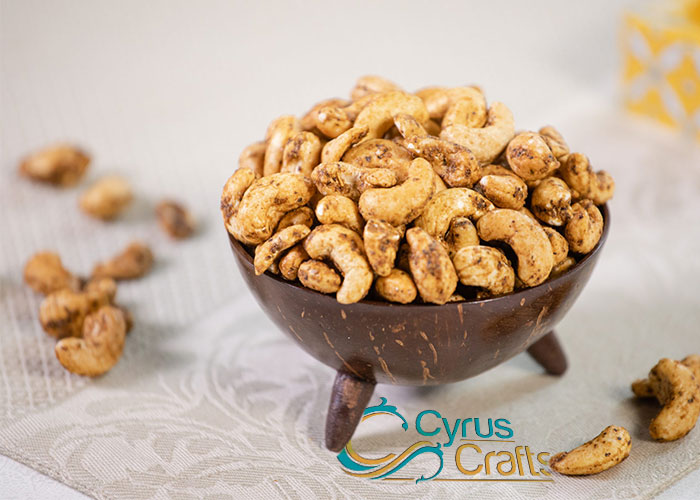
Easily Add Cashews to Your Diet
They can be eaten "raw" or roasted, making for an easy portable snack. You can see other examples of useful Iranian snacks in the Cyruscrafts online store.
It can also incorporate whole or ground cashews into various dishes, ranging from scrambled tofu and stir-fries to soup, salads, and stews.
Cashew butter is another way to add cashews to your diet. Spread it on toast or stir it into yogurt or oatmeal. To make homemade, bake-free energy balls, you can also process cashew butter, oats, and your favorite dried fruit.
Remember that some roasted and salted cashews contain significant amounts of added oils and salt. Choose dry roasted or "raw" unsalted cashew varieties to limit excess salt or added fats.
Cashews Side Effects
Cashews are a safe addition to most people's diets.
Cashews that have been roasted or salted contain high levels of added oils or salt. Therefore, choosing unsalted dry roasted or raw (unroasted) varieties may be the best.
According to some research, roasted cashews may contain more antioxidants than unroasted cashews. If you want to roast cashews without adding extra oils, consider roasting them yourself.
On a baking sheet, spread your unroasted cashews in one layer. After that, dry them for 8–15 minutes at 350°F (188°C). Stir the cashews every 3–5 minutes to prevent burning.
You can toast your cashews in a skillet for 3–5 minutes over medium heat.
In addition, cashews contain phytate, which makes it more difficult for your body to absorb their vitamins and minerals. Soaking nuts overnight can reduce their phytate content and improve their digestibility.


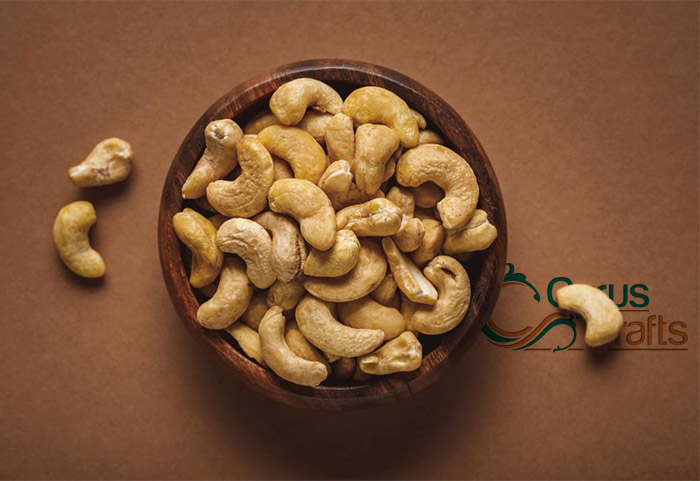


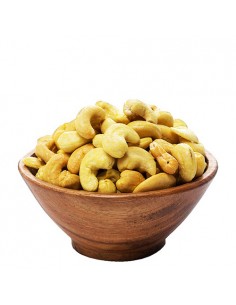

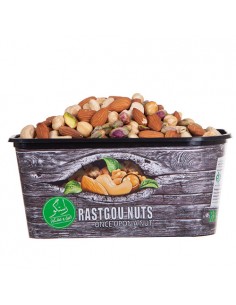



Comments (0)